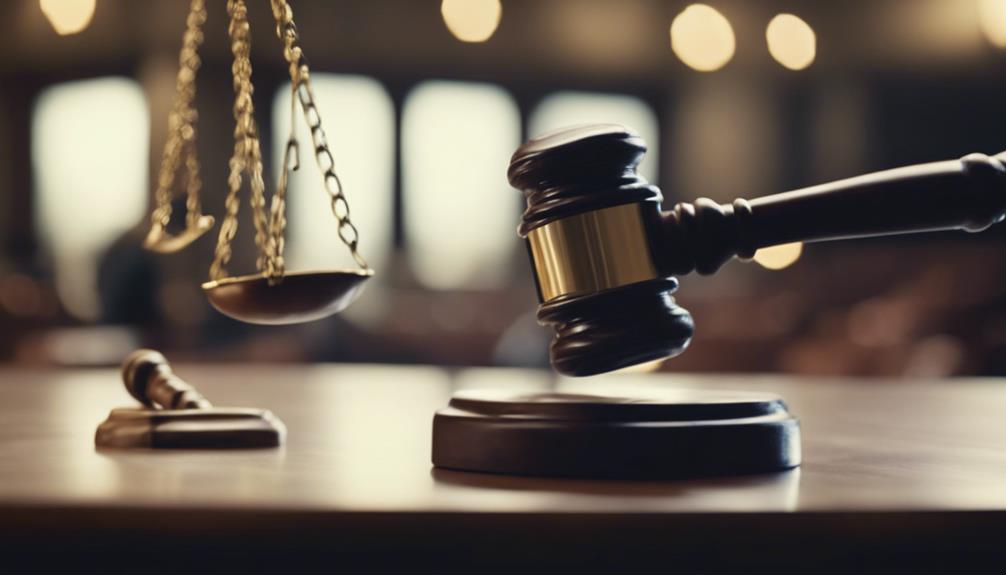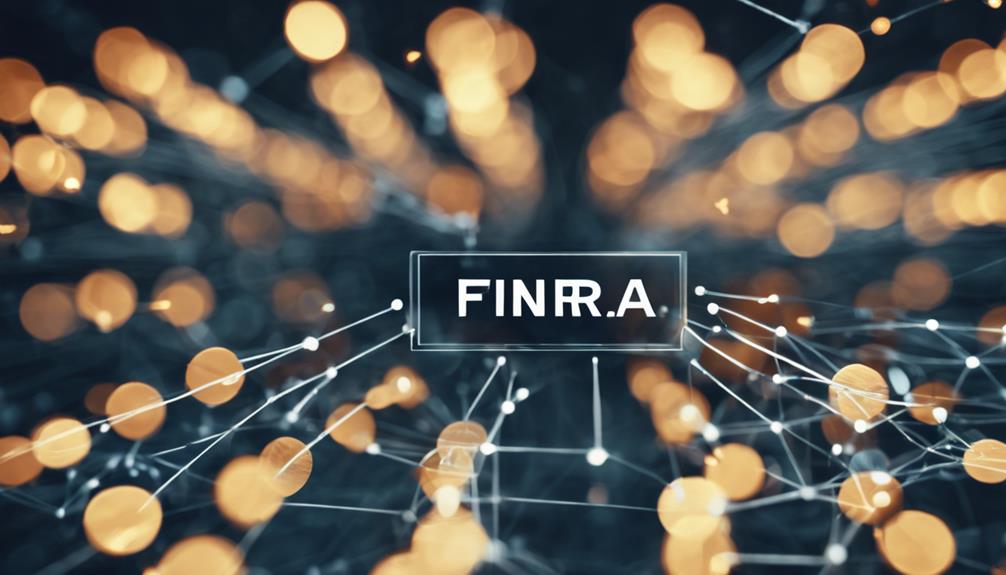Established in 2007, FINRA, which was created from the merger of NASD and NYSE, is responsible for overseeing securities firms in the United States. It plays a crucial role in regulating securities trading, ensuring investor protection, and upholding market integrity. In 2020 alone, FINRA fined firms a total of $57 million and banned 246 individuals for various violations. Working closely with the SEC, FINRA enforces rules and fights against fraud. By incorporating advanced technology like AI into its surveillance efforts, FINRA is paving the way for more efficient regulatory practices. These advancements help ensure compliance with securities laws and market regulations. To learn more about the vital role FINRA plays in shaping the financial industry, click here.
Key Takeaways
- FINRA regulates U.S. securities firms for investor protection.
- Monitors thousands of brokerage firms and imposes fines.
- Upholds market integrity through disciplinary actions and fines.
- Collaborates with agencies on fraud and insider trading cases.
- Embraces technology for efficient regulatory practices.
Establishment and Purpose of FINRA

Established in 2007 through the merger of NASD and NYSE operations, FINRA serves as a self-regulatory organization for U.S. securities firms. As a regulatory body in the securities industry, FINRA plays a vital role in overseeing the activities of brokerage firms to guarantee compliance with industry standards and regulations. By regulating the trading of securities and derivatives, FINRA aims to safeguard investors and maintain the integrity of the market.
In replacing NASD, FINRA took on the responsibility of supervising professionalism, ethical standards, securities advertising, and investor product matching within the financial industry. This self-regulatory organization works in conjunction with the Securities and Exchange Commission (SEC) to enforce rules and regulations that govern securities firms. Through its regulatory oversight, FINRA contributes to fostering transparency and trust in the securities market, promoting fair and efficient practices among market participants. As a key player in the financial sector, FINRA's commitment to upholding regulatory standards is essential for maintaining a well-functioning and trustworthy securities industry.
Regulatory Oversight and Compliance

Ensuring regulatory compliance and oversight, FINRA monitors thousands of brokerage firms and branch offices across the United States. With over 3,400 registered firms and 152,000 branch offices under its purview, FINRA plays a pivotal role in maintaining the integrity of the financial industry.
In 2020 alone, FINRA took decisive action by initiating 808 disciplinary actions to enforce compliance standards. These efforts resulted in fines amounting to $57 million to deter misconduct and protect investors' interests. Additionally, restitution totaling $25.2 million was ordered to be paid to investors who suffered losses due to violations.
As part of its enforcement actions, FINRA barred 246 individuals from engaging in the securities business, illustrating the organization's commitment to upholding ethical practices. Two member firms faced expulsion, two others were suspended, and 375 individuals were subjected to suspensions.
Moreover, FINRA's collaboration with other agencies, such as the SEC, through the referral of 970 fraud and insider trading cases, demonstrates its dedication to maintaining market integrity.
Investor Protection and Market Integrity

We oversee regulatory compliance standards, supervise market activities, and take enforcement actions against violations.
Our goal is to protect investors and ensure market integrity through thorough oversight and proactive measures.
Regulatory Compliance Standards
In safeguarding investor interests and preserving market integrity, FINRA diligently upholds regulatory compliance standards. The organization guarantees firms adhere to ethical practices, protecting investors from fraud and unethical behavior in the financial industry.
Through examinations, FINRA monitors regulatory standards, promoting investor protection and fair market practices. Disciplinary actions, such as fines and suspensions, are enforced to maintain transparency and equity in the market.
Supervision of Market Activities
Safeguarding investor interests and market integrity, FINRA diligently supervises market activities to guarantee compliance and protect investors. With oversight spanning over 3,400 brokerage firms and 152,000 branch offices in the U.S., FINRA plays a crucial role in maintaining a fair and transparent market.
In 2020 alone, FINRA took regulatory actions by initiating 808 disciplinary actions, resulting in fines totaling $57 million. Additionally, $25.2 million was ordered in restitution to investors, and 246 individuals were barred from the securities business. By focusing on market integrity, FINRA ensures that broker-dealers, capital acquisition brokers, and funding portals adhere to regulatory standards, ultimately fostering trust and confidence in the financial industry.
Enforcement Actions Against Violations
To uphold investor protection and market integrity, FINRA rigorously enforces disciplinary actions against violations in the financial industry. In 2020, FINRA initiated 808 enforcement actions, resulting in fines of $57 million and $25.2 million in investor restitution. Additionally, 246 individuals were banned from the securities business, and four firms faced expulsion or suspension. The organization also forwarded 970 cases of fraud and insider trading to other regulatory bodies for further investigation. By focusing on these enforcement actions, FINRA aims to safeguard investors and ensure the fairness and transparency of the financial market. Through penalizing misconduct and upholding ethical standards, FINRA plays a critical role in maintaining market integrity.
| Enforcement Actions | Statistics | Impact |
|---|---|---|
| Fines | $57 million | Financial penalties |
| Restitution | $25.2 million | Compensation for investors |
| Individuals Banned | 246 | Exclusion from securities industry |
| Firms Expelled | 2 | Removal from membership |
| Cases Referred | 970 | Further investigation |
Enforcement Actions and Disciplinary Measures

In 2020, FINRA took action against 808 violations, resulting in fines totaling $57 million and restitution orders of $25.2 million to investors.
Additionally, 246 individuals were barred from the securities business, underscoring the importance of regulatory oversight processes in the financial industry.
These enforcement actions play a pivotal role in upholding market integrity and safeguarding investors against misconduct.
Penalties for Violations
Implementing strict penalties for violations is essential in maintaining integrity and trust within the financial industry. In 2020, FINRA took decisive action, initiating 808 disciplinary actions and imposing fines totaling $57 million for securities violations.
Remarkably, $25.2 million was ordered in restitution to investors, with 246 individuals being barred from the securities business due to misconduct. Additionally, to combat fraud and insider trading, FINRA referred 970 cases to the SEC and other agencies for further investigation and prosecution.
The expulsion of two member firms, suspension of two others, and 375 individuals facing suspensions demonstrate FINRA's commitment to upholding market integrity and protecting investors from fraudulent activities. These disciplinary measures serve as a deterrent, safeguarding the financial sector's credibility and ensuring compliance with regulatory standards.
Regulatory Oversight Processes
We executed 808 disciplinary actions in 2020 and levied fines totaling $57 million to uphold regulatory standards within the financial industry. Additionally, $25.2 million was ordered in restitution for investors, with 246 individuals barred from the securities business due to misconduct.
Two member firms faced expulsion, while two were suspended, and 375 individuals received suspensions for regulatory violations.
Moreover, FINRA referred 970 cases of fraud and insider trading to the SEC and other agencies to maintain market integrity. These enforcement actions signify our unwavering commitment to investor protection and the preservation of ethical standards in the financial industry.
Through rigorous regulatory oversight and decisive enforcement actions, we aim to ensure a fair and transparent marketplace for all participants.
Role of FINRA in the Financial Industry

Playing a pivotal role in the financial industry, FINRA regulates registered brokers and broker-dealer firms in the U.S. to safeguard investors from fraudulent activities and unethical practices. With oversight of over 3,400 brokerage firms and 152,000 branch offices, FINRA ensures compliance with securities laws, maintaining market regulation for equities, corporate bonds, securities futures, and options trading.
In 2020, the organization took decisive action by initiating 808 disciplinary actions, resulting in fines of $57 million and ordering restitution of $25.2 million to investors. Importantly, FINRA barred 246 individuals from the securities business, expelled two member firms, and suspended 375 individuals as part of its enforcement efforts. Moreover, demonstrating a commitment to market integrity, FINRA referred 970 fraud and insider trading cases to the SEC and other agencies.
Through its robust enforcement actions and regulatory measures, FINRA plays an essential role in upholding the integrity and trustworthiness of the financial markets.
Future Trends and Developments in FINRA

Embracing cutting-edge technology and innovative approaches, FINRA is poised to revolutionize its regulatory practices for the future. By investing in regulatory technology and artificial intelligence, FINRA is at the forefront of market surveillance. With the capacity to monitor up to 100 billion transactions daily, the organization efficiently processes vast amounts of data using cloud computing and AI.
Through the integration of advanced information systems that combine search engine capabilities and analytics technology, FINRA strengthens its market surveillance efforts. Artificial intelligence plays a pivotal role in detecting potential market abuses, enhancing regulatory oversight in U.S. markets. The utilization of regulatory technology not only aids in identifying violations but also safeguards the integrity of security firms and brokers.
As FINRA continues to evolve, its commitment to leveraging technology to uphold market integrity remains unwavering, setting the stage for a future where regulatory practices are more efficient, effective, and technologically advanced.
Frequently Asked Questions
What Are the Objectives of Finra?
The objectives of FINRA are to protect investors from fraud and unethical practices, maintain market integrity by regulating securities trading, educate industry professionals on compliance with ethical standards, and match investment products to investor needs for responsible practices.
FINRA upholds professionalism and ethical standards in the securities industry through its regulatory functions.
What Are the Core Values of Finra?
The core values of FINRA encompass market integrity, expertise, and collaboration.
We prioritize diversity, equity, and inclusion, ensuring a fair and transparent financial environment.
Monitoring 67 billion electronic records daily, we uphold market integrity and investor safety.
Our regulatory efforts focus on fostering investor trust and participation.
Through engagement with stakeholders, we drive innovation and aim for solutions that benefit the financial sector as a whole.
How Does the Financial Industry Regulatory Authority Protect Investors and Ensure Fair Markets?
To safeguard investors and promote fair markets, FINRA oversees registered brokers and broker-dealer firms, imposing fines, ordering restitution, and initiating disciplinary actions.
Collaborating with the SEC, FINRA refers cases for litigation and prosecution, taking action against misconduct to uphold market integrity.
Which of the Following Are Among the Responsibilities of Finra?
Among the responsibilities of FINRA are enforcing ethical standards, regulating securities advertising, and matching investment products to investor needs.
The organization educates industry professionals on compliance, market trends, and best practices.
Supervised by the SEC, FINRA plays a pivotal role in safeguarding investor interests and maintaining a fair financial market.
Conclusion
To sum up, FINRA is the regulatory watchdog of the financial industry that diligently enforces rules to protect investors and maintain market integrity. With a key role in compliance and enforcement actions, FINRA plays an essential part in upholding standards.
As we look towards the future, we can expect continued advancements and developments in FINRA to adapt to the ever-changing landscape of the financial world. Let's hope they keep those financial wolves in sheep's clothing at bay! With the rise of blockchain technology and the growing popularity of cryptocurrencies, it will be critical for FINRA to implement robust regulations that strike a balance between innovation and investor protection. Ensuring transparency and accountability will be especially important as the future of digital currency becomes increasingly integrated into mainstream financial markets. By staying proactive and adaptable, FINRA can help foster a secure and trustworthy environment for all participants in this evolving ecosystem.











